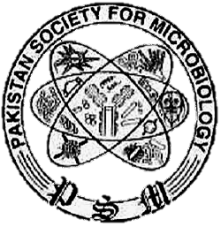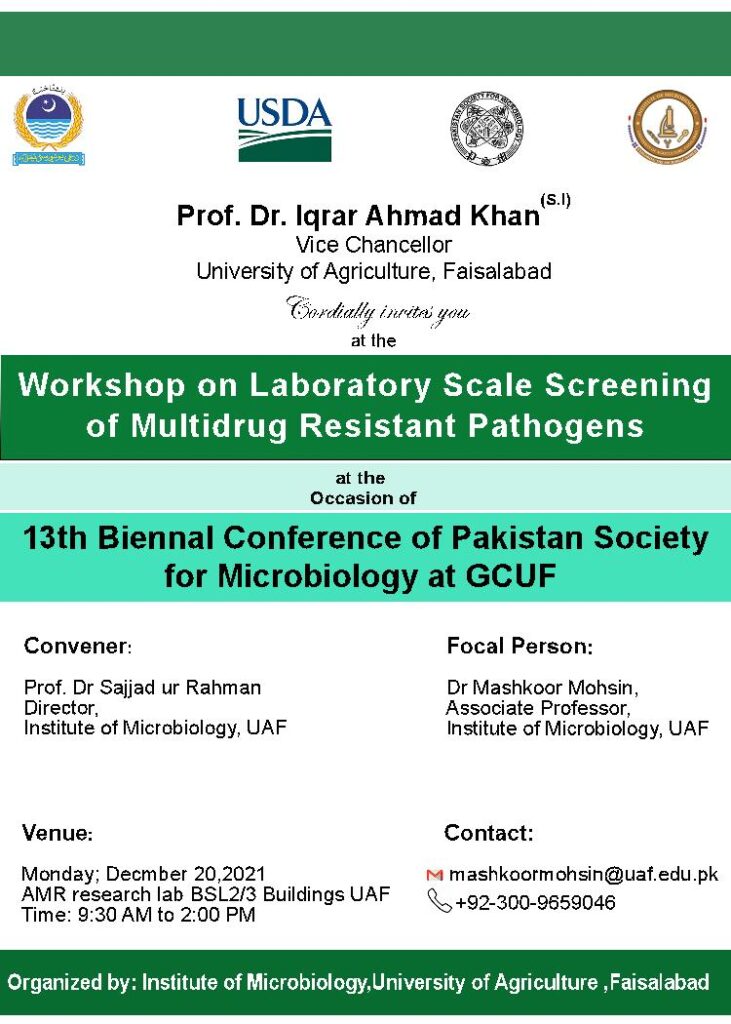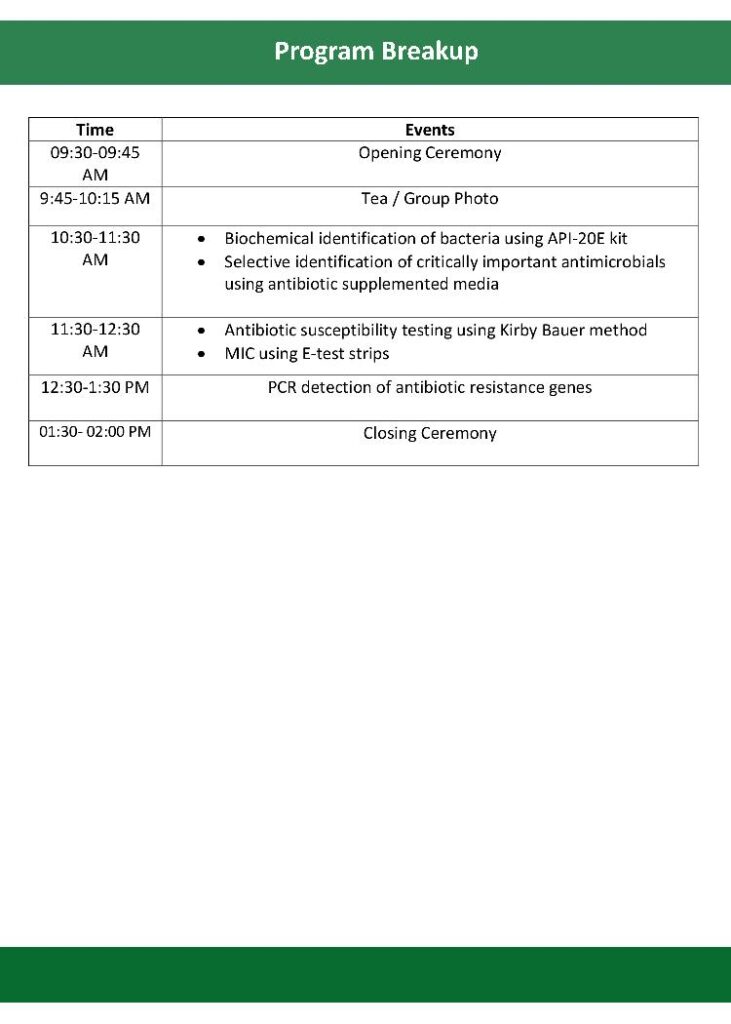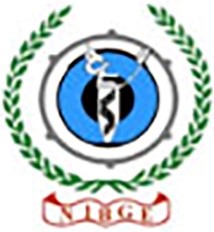DETAILS AND FEE of
ASM-PSM workshops during and prior to 13th Biennal Conference of Pakistan Society for Microbiology
ONE HEALTH APPROACH IN DISEASE SURVEILLANCE AND CONTROL IN PAKISTAN(FREE)REGISTER NOW |
|
|---|---|
Workshop on Laboratory Scale Screening of Multidrug-Resistant Pathogens (1500 PKR for Conference participants) |
|
ASM-PSM workshop on Biosafety and Biosecurity(FREE)REGISTER NOW |
|
Hands-on Training on Molecular Viral Diagnostics (2500 PKR for Conference Participants) |
|
Workshop on Microbial Metagenomics and Bioimaging (2500 PKR for Conference Participants) |
|
Workshop on Research Ethics and Integrity (FREE)REGISTER NOW |
|
Workshop on How to write a research proposal (FREE)REGISTER NOW |
ASM-PSM workshop ” ONE HEALTH APPROACH IN DISEASE SURVEILLANCE AND CONTROL IN PAKISTAN”
Workshop Facilitator/ Organizer: Fatima Aziz ASM Young Ambassador (Aga Khan University- Karachi)
Speakers:
Ms. Fatima Aziz (ASM Young Ambassador/ Aga Khan University)
Dr. Zahida Fatima, (FAO/ PARC– Islamabad)
Dr. Ghulam Fatima (Civil Hospital Karachi
Dr. Usman Qamar (Govt College University Faisalabad)
Dr. Shahana Urooj Kazmi (WUS – KPK)
| Session Details | Speaker/ Facilitator |
| Ms. Fatima Aziz | Emergency preparedness & biorisk management. |
| Dr. Zahida Fatima | ONE HEALTH: A Perspective for Pakistan |
| Dr. Ghulam Fatima | Nosocomial infections: Epidemiology, prevention and control |
| Dr. Usman Qamar | Advancing the One Health response to Antimicrobial Resistance |
| Dr. Shahana urooj Kazmi | Concluding Remarks |
Who can apply?
The students with One Health, Biosafety, Infectious Diseases/ Zoonotic diseases Microbiology, Public Health
Preferably: M.Phil./Ph.D. students and professionals from Biomedical Laboratories/veterinarian
Number of participants: 25-30
Duration: 3-4hours
Venue: NIBGE Faisalabad
Session Description:
The One Health (OH) concept recognizes that the health of humans is connected to the health of animals and the environment. One Health is a day-to-day and very practical concept and forging a strong links between human and animal health ecosystem, the environment and public policy. This workshop aims to emphasize on One Health concept in Pakistan. This workshop will also bring together a significant number of diverse researchers to disseminate information about Zoonoses, pathogen diversity, antibiotic challenges, pandemic preparedness in emerging infectious diseases & biorisk assessment.
Learning objective:
Implementing One Health strategies for disease surveillance, response, preparedness, prevention and control activities in the current and future pandemic preparedness.
Outcome of the workshop:
Upon completion of this workshop, the participants will be able to:
- Recognize and understand the concept of One Health and zoonotic potential of presented diseases
- Control of emerging and re-emerging infectious diseases
- Measures to tackle antimicrobial resistance
- Biorisk Management under One health umbrella
ASM-PSM workshop “Biosafety and Biosecurity”
Workshop Facilitator/ Organizer:
Dr. Nain Tara Bukhari HOD & Assistant Professor, Department of Clinical Laboratory Sciences, Women University Swabi, KPK, Pakistan
Dr. Amtul Sami HOD & Assistant Professor, Department of Microbiology & Molecular Biotechnology, Women University Swabi, KPK, Pakistan
Objective:
Epidemics of diseases like coronavirus might pose substantial tasks to international safety committees by failing national economies and automatically effect on international employment. Biosafety is complementary to biosecurity, when working with potentially infectious microorganisms and other biological hazards and refers to the implementation of laboratory practices and procedures, specific construction features of laboratory facilities, safety equipment, and appropriate occupational health programs. This workshop will focus to converge the safety of diverse researchers and provide information about the safety practice and measures in order to handle the pathogenic organism to reduce the biorisk.
Speakers:
Dr. Nain Tara Bukhari HOD & Assistant Professor, WUS
Dr. Amtul Sami HOD & Assistant Professor, WUS
Dr. Muhammad Usman Qamar, Assistant Professor GCUF
Number of participants: 30-40
Workshop Duration: 3hours
Session Description:
Dr. Nain Tara Bukhari “Role of Biosafety in Hospital Acquired Infection”
Lecture with hands-on learning which include: Hand Washing Techniques, PPEs, Donning & Doffing, Spill Kit preparation
Dr. Amtul Sami “Sterilization and Good Microbiological Practices”
Lectures and spill management procedure
Dr. Muhammad Usman Qamar “Laboratory acquired Infections”
Lecture with hands-on training Needlestick injury
Date and venue:
23rd December, Lecture Theatre I, Department of Microbiology, Government College University Faisalabad.
Learning objective:
The main objectives of this workshop are to highlight Biosafety and Biosecurity in medical practices during laboratory working and personal hygiene in pandemic situations.
The outcome of the workshop:
After completion of this workshop, the participant will be able to:
-
Understand the concept of personal hygiene and safety practices during working in the microbiological lab.
-
Spill management after working in a pathogenic laboratory
-
Measures to the confrontation of antimicrobial pathogenicity.
-
Biosafety and biosecurity practices.
PSM-NIBGE Hands-on Training on Molecular Viral Diagnostics
at
National Institute for Biotechnology and Genetic Engineering (NIBGE)
on
Tuesday, December 21, 2021
Resource persons
Dr. Imran Amin
Dr. Shahid Mansoor, SI
Dr. Waqas Rafiq
Mr. Muhammad Jawad Akbar Awan
Session 1 |
||
Time |
Title |
Speaker |
9:00- 9:40 |
An overview of current knowledge of virology |
Dr. Shahid Mansoor SI |
9:40- 10:20 |
Viral diagnostics and use of PCR and real-time quantitative PCR |
Dr. Imran Amin |
10:20-10:45 |
Tea break |
|
10:45- 1:30 |
DNA extraction and conventional PCR for viral diagnostics |
Dr. Imran AminDr. Waqas RafiqMr. Muhammad Jawad |
1:30-2:00 |
Lunch/Prayer break |
|
Session 2 |
||
2.00-3:15 |
RNA extraction and real-time quantitative PCR for viral diagnostics (Ist part) |
Dr. Imran AminDr. Waqas RafiqMr. Muhammad Jawad |
3:15-3:30 |
Tea break |
|
3:30-5:00 |
RNA extraction and real-time quantitative PCR for viral diagnostics (2nd part) |
Dr. Imran AminDr. Waqas RafiqMr. Muhammad Jawad |
REGISTER NOW
PSM-NIBGE Workshop on Microbial Metagenomics and Bioimaging
at
National Institute for Biotechnology and Genetic Engineering (NIBGE)
on
21 December 2021
Resource persons
Dr. Asma Imran
Mr. M. Farooq
Mr. Javed Iqbal
Mr. Ahmad
Session 1 |
||
Time |
Title |
Speaker |
9:00- 9:30 |
Metagenomics and bioimaging |
Dr. Asma Imran |
9:30- 10:00 |
Confocal Microscopy |
Dr. Asma Imran |
10:20-10:20 |
Tea break |
|
10:30- 1:30 |
DNA extraction from soil/microbesMicrobial genomicsData interpretation and analysis |
Mr. M. FarooqMr. AhmadMr. Shoaib |
1:30-2:00 |
Lunch/Prayer break |
|
Session 2 |
||
2.00-3:15 |
Transmission Electron Microscopy |
Mr. Javed Iqbal |
3:15-3:30 |
Tea break |
|
3:30-5:00 |
Transmission Electron Microscopy |
Mr. Javed Iqbal |
Who can apply?
-
The students with biotechnology/microbiology/genomics background
-
Preferably PhD/MPhil Scholars
-
Minimum No. of students per course: 10
-
Maximum No of students: 25-30
-
Course Fee: Rs. 3500.00
-
Venue: NIBGE Faisalabad
REGISTER NOW
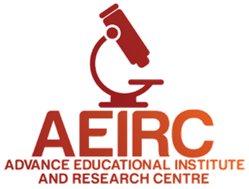 Workshop on Research Ethics and Integrity
Workshop on Research Ethics and Integrity
FACILITATORS:
-
Professor Dr. Syed A. Aziz (Ph.D.)
-
Sadaf Ahmed (Ph.D.)
-
Shamoon Noushad (M.Phil, CRCP)
The argument for the use of animals in research, and in particular in research for human conditions, tends to be a practical one. Although there are some suffering and harm to the animals, the benefits to people and animals outweigh the disadvantages: the ends justify the means. While there are still useful aspects of this work’s justification, it is quite different from research on animals in which the goal is to benefit humans. In comparison, Human research is conducted with or about people, or their data or tissue. Therefore, human participation in the study is to be understood broadly to include human beings’ involvement.
Outline
-
How To Deal With Specimen, Animals & Humans Within Boundaries Of Ethics????
-
Benefits as a Result of Animal Research
-
The Legal Obligations
-
What are the Issues with Animal Research?
-
Basic animal rights
-
The 3Rs
-
Animal (Scientific Procedures) Act
-
Laboratory Animal “Program
-
A Historical Perspective on the Animal Welfare Regulations
-
Case Study
-
Human subjects
-
Evolution of Research Ethics Guidelines
-
Principles of Research Ethics
-
Vulnerable Populations
-
Foundations of Ethics in Research
-
Ethical Codes, Standards, and Regulations
-
Pillars of Protection for Human Subjects Research
-
Case Study
REGISTER NOW
Workshop on Academic Research Writing
The workshop bridges the research, writing, and publishing stages of a project, emphasizing research output and developing a publication strategy. The workshop will tackle issues including publication timeframes, rejection rates, optimizing your submissions, and the research strategies and skills you need to help your research blossom into a beautiful publication (while reaching the best audience for your work.)
Duration
4 hours
Target Audience:
-
This workshop is open to all researchers at all levels and will be particularly useful for those beginning their research careers.
Outline
-
Where & How to publish
-
Referencing
-
Plagiarism
-
How to execute a paper
-
Journal submission
-
Ethics
-
Impact factor; myths & facts
-
Peer review, how reviewers access manuscripts.
Outcomes
-
Participants will be able to structure good manuscripts and to make it as revealing as possible
-
Builds a better sense of how each section of a document operates as an individual informative unit and as part of a larger logical whole.
-
Training in how to respond to editors and reviewers who read your work.
-
Improved overall writing skills with immediate and individual feedback.
Benefits for the Individual
-
Learn and gain knowledge firsthand from the researchers.
-
Open forum for discussion – easy learning.
-
Through research-based learning, students can develop the intellectual skills of critical analysis and also valuable transferable skills such as group work, time and resource management and data handling.
Workshop on How to write a research proposal
This workshop will try to appraise the techniques in writing a grant proposal. This exercise will bridge the gap between a request for a grant to obtain the research fund. The workshop will tackle the issues in formulating a good proposal for successful funding.
Duration
4 hours
Target Audience:
-
This workshop is open to all researchers at all levels and will be particularly useful for those beginning their research careers.
Outline
-
How to write the proposal
-
Referencing
-
How to the grant
-
Where to submit
-
Ethics
-
Peer review,
Outcomes
- Participants will be able to formulate a good grant proposal and to make it as revealing as possible
- Builds a better sense of how each section of a document operates as an individual informative unit and as part of a larger logical whole.
- Training in how to respond to reviewers.
Benefits for the Individual
- Learn and gain knowledge firsthand from the researchers.
- Open forum for discussion – easy learning.
- Through research-based learning, students can develop the intellectual skills of critical analysis and also valuable transferable skills such as group work, time and resource management and data handling.
